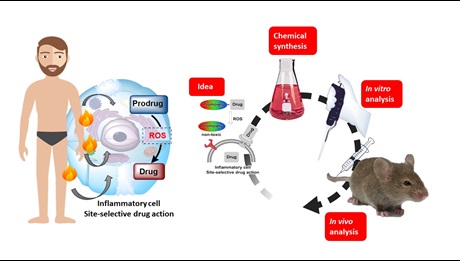Reactive Oxygen Species

We have designed new types of prodrugs for treatment of rheumatoid arthritis (RA). Our key hypothesis is that we can increase the drug safety for patients undergoing life-long treatment for this autoimmune disease by employing a selective prodrug concept. The concentration of reactive oxygen species (ROS) is increased in inflammatory tissue compared to healthy tissue (10–1000 fold) and we are exploiting this as a trigger for drug release. This will in turn enable more selective palliative treatment of RA by reducing side effects.
The project encompasses the chemical synthesis of prospective prodrugs and their characterization in vitro and in vivo. We study their activity, selectivity, ROS activation and efficacy in a rodent collagen-induced arthritis model. Current research is focused on expanding the range of prodrugs and improving their safety and targeted release in vivo:
Output: J. Med. Chem., Eur. J. Med. Chem., Med. Chem. Commun.,
Bioorg. Med. Chem.
In 2018, the company ROS Therapeutics was founded with the aim to carry out (pre)clinical development of one of our prodrugs.